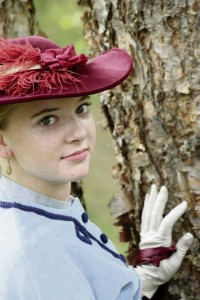Ramstein High School senior Kat Rosewitz is a normal, busy student, entering into talent shows and preparing for graduation. But this student also keeps busy with a much more unusual activity — she has a passion for historical re-enactments.
Rosewitz admits her hobby is not the typical teenage pastime, but said she was born into it. Rosewitz’s parents actually met at a re-enactment and later had a Civil War wedding. With that kind of passion, it was hard for Rosewitz and her two sisters not to become involved in historical re-enactments, too.

“In Europe, the events are typically attended by American and British military units with the purpose of re-enacting, as accurately as possible, various historical events and battles,” Rosewitz said.
Though many of the participants in the re-enactments have a military background, anyone can become a re-enactor.
The Rosewitz family has enough combined knowledge and costumes to participate in re-enactments extending from the French and Indian War all the way to World War II. Rosewitz and her family’s favorite time era and the period for which they have the most costumes is the Napoleonic War.
The Rosewitz family makes all their costumes by hand. Rosewitz said her dad is the main tailor in the family followed by her older sister, Emily, and then Rosewitz herself.
A typical historical re-enactment usually occurs over a three-day period and is open to the public.
“You really need to know what you are talking about, because people come up to you during the re-enactments and ask you questions that you need to be able to answer in an accurate way,” Rosewitz said.
On Fridays, the opening ceremony takes place, and there is usually a parade, speeches or possibly one single battle re-enactment. Many school groups come on Fridays. Each morning and evening, the military units summon their call to colors for the public. Throughout the day, there are bands playing, vendors selling products and speeches being made while the battle re-enactments are taking place.
For large events that have excellent historical documentation, such as Bicentennial of Leipzig’s Battle of Nations, the entire historical experience is choreographed down to the minute. In one battle re-enacted, Rosewitz said she had to lay on the ground and pretend to be dead for more than an hour.
Rosewitz said her passion for history has grown from her participation in historical re-enactments.
“There is a big difference between seeing or hearing about history and actually acting out a character in time,” she said. “By participating in the experience, you appreciate all the details much more.”
Rosewitz said she enjoys getting dressed up in the fancy clothes for the balls the most. Rosewitz and her family are members of the Regency Society of Virginia, which has taught her different period dances, such as the Yellow Stocking, the Virginia Reel and the Polka.
At times, Rosewitz tries to drag her friends to the events, and she has managed to get some of her friends hooked on historical re-enactments. Rosewitz even organized a youth workshop on women’s clothing during the Civil War.
During the workshop, Rosewitz taught teens about the difference between corsets and stays and work and tea dresses. Students in the workshop also learned historical trivia, such as the term “dressing to the nines,” which dates back to the Civil War era when women normally dressed in nine layers of clothing.
This year, Rosewitz is graduating and heading off to college, but she said she’s still planning on being involved in historical re-enactments after high school.
In fact, as a graduation gift, her father is taking her to the Italian island of Elba in the Mediterranean Sea to the Napoleonic Bicentennial weekend.


